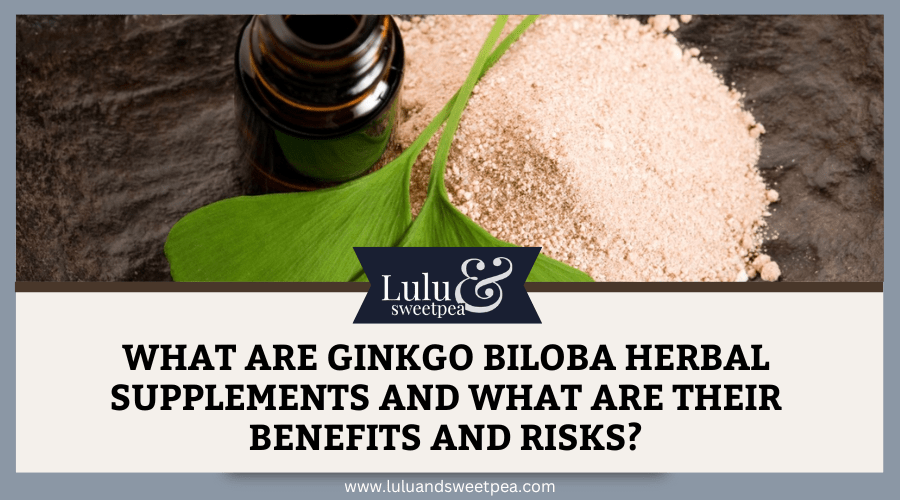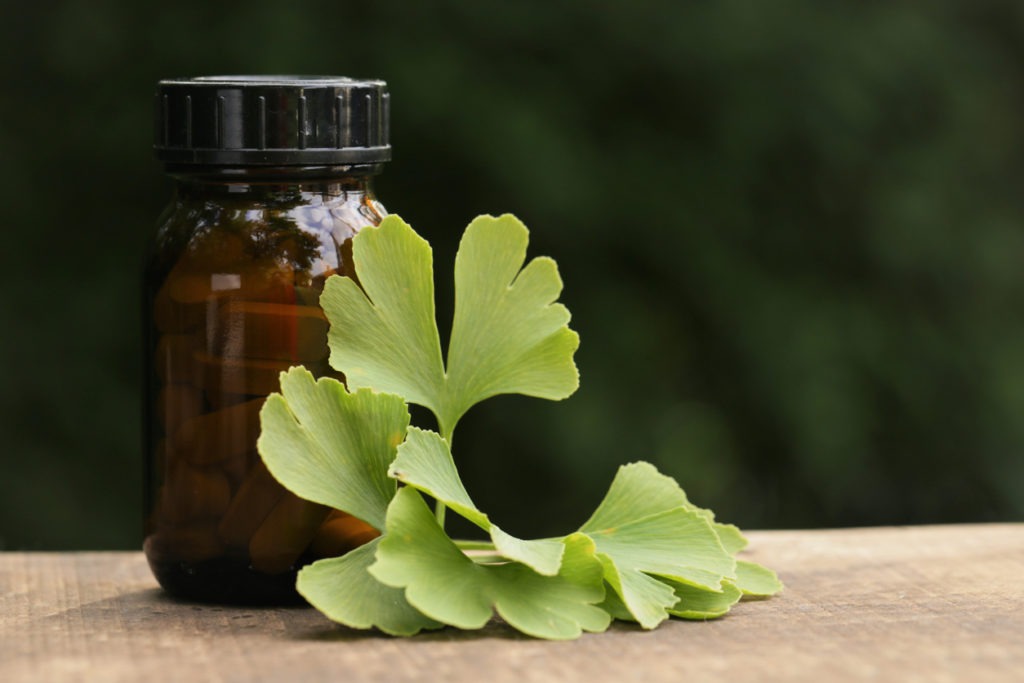Over the years, the world has come to appreciate the natural therapeutic effect of ginkgo biloba, which has helped transform tree extract into one of the most popular forms of Chinese medicine.
In the US, ginkgo health supplements are used to help treat different health problems, including blood disorders and memory loss. It can also enhance cardiovascular function, eye health, and sexual energy. This top-selling supplement is available in capsules, tablets, dried leaves/tea, and liquid extracts. People use it for different reasons. In this article, learn about the benefits of ginkgo biloba herbal supplements and its risk and precautions.
What is Ginkgo Biloba?
Ginkgo biloba, commonly known as ginkgo or ginkgo, is also known as the maidenhair tree – a tree species native to China. It’s the last living species in the order of Ginkgoales, which first appeared over 290 million years ago. Ginkgo has been grown for thousands of years. Because ginkgo biloba is the only surviving member of an ancient order of plants, it’s sometimes called a “living fossil.”
Traditional Chinese medicine uses its leaves and seeds, but modern medicine and research primarily focus on its extract, which comes from the leaves. The extract collected from the leaves is available in different supplement forms. Nowadays, it’s a popular supplement and one of the most sought-after herbal medicines.
Benefits of Gingko Biloba Supplements
Gingko biloba is probably most known for its benefits to cognitive function, but it offers a whole lot more. Traditional uses are wide-ranging, but not all of them are confirmed by science. Here are some of the research-backed benefits of ginkgo biloba supplements:
1. It contains powerful antioxidants.
Ginkgo comes with potent antioxidants, which fight the damaging effects of free radicals. Its antioxidant content may be the reason behind many of its health benefits.
This plant contains high levels of terpenoids and flavonoids, which are compounds known for their strong antioxidant effects. Antioxidants neutralize and fight cell and tissue damage in the body, thus helping prevent the risk of developing diseases and slow down aging.
2. It can help fight inflammation.
Inflammation is our body’s natural response to injury or invasion by a foreign substance, and in that response, the immune system is recruited to fight against the injury or the foreign invader. And some chronic diseases trigger inflammatory responses even if no illness or injury is present. As we age, this excessive inflammation can cause damage to the body’s DNA and tissues.
Studies have found that ginkgo extract can reduce inflammation markets in both human and animal cells. Some specific diseases and conditions in which ginkgo extract has been shown to reduce inflammation include arthritis, heart disease, stroke, irritable bowel disease (IBD), and cancer (1,2).
3. It can improve blood circulation.
Traditional Chinese medicine utilized ginkgo seeds to open “channels” of energy to different organ systems, including the liver, brain, kidneys, and lungs. The apparent ability of the plant to increase blood flow toward different parts of the body may be the origin of its many supposed benefits.
A study in people with heart disease has shown an immediate increase in blood flow to multiple body parts after supplementing ginkgo biloba. Another study produced the same result in healthy elderly adults.
Treatment with ginkgo biloba has also been shown to lessen cognitive and neurological impairment without increasing the risk of cardiovascular disease.
4. It can reduce symptoms of dementia.
Ginkgo biloba is widely known as the “brain herb,” as studies have shown that it can help improve memory in people with dementia. It’s one of the most promoted benefits of the herb. Some of its benefits include improved memory and thinking, better social behavior, and a better ability to perform everyday tasks.
A study found that ginkgo Biloba extract was clinically effective in treating dementia in Alzheimer’s, and another source found that it was safe to use and potentially effective in stabilizing and improving the cognition and social function of patients with dementia.
Researchers believe ginkgo improves cognitive function because it improves blood flow to the brain and protects the brain and other parts from neuron damage.
5. It may improve brain function and memory.
A handful of small studies (1, 2) support the notion that ginkgo biloba may enhance brain function in healthy people by increasing mental performance and perceived well-being. The results from these studies gave rise to claims that ginkgo can improve focus, memory, and attention span.
However, it’s unclear whether ginkgo helps memory in people who have normal, age-related memory loss. Supplementing with ginkgo in healthy people may help improve mental capacity, but there are no guarantees.
6. It may help reduce depression and anxiety.
Gingko biloba may also be used to treat and reduce symptoms of anxiety, depression, and other psychiatric disorders.
A study published in the Journal of Psychiatric Research revealed that people with a generalized anxiety disorder could experience relief by taking ginkgo biloba supplements. However, those who take Xanax for their anxiety should not supplement with ginkgo because it may reduce the drug’s effectiveness.
A review of animal studies suggests that ginkgo supplements may help treat symptoms of depression by lessening stress levels – thanks to ginkgo’s anti-inflammatory properties. Nonetheless, depression is a complex disorder that may have different root causes. For people whose depression is mostly caused by stress, ginkgo biloba supplements may help. But still, more research is needed to support these claims.
7. It may support eye health.
There are a few research that investigates how ginkgo is beneficial for vision and eye health. However, the results are promising.
A review revealed that people with glaucoma experienced increased blood flow to the eye after ginkgo supplementation, and another review evaluated the effect of ginkgo extract on age-related macular degeneration. Some experienced vision improvement.
The potential of ginkgo biloba for improving symptoms of glaucoma and age-related macular degeneration are both related to its ability to increase blood flow to the eyes. However, more research is necessary to determine if ginkgo can improve vision capacity or slow the progression of degenerative eye disease.
8. It can reduce symptoms of PMS.
PMS can be a pain, and ginkgo may help reduce both premenstrual syndrome’s physical and psychological symptoms (PMS). A study involving college students revealed a reduction in PMS symptoms after consuming ginkgo. Taking ginkgo leaf extract orally reduces breast tenderness and other symptoms associated with PMS.
9. It can improve sexual dysfunction.
Gingko may also benefit sexual health, especially if you are experiencing low libido or erectile dysfunction.
Ginkgo can improve circulation through the dilation of blood vessels. As a result, it can be useful for treating different symptoms of sexual dysfunction by improving blood flow to the genitals and other areas of the body.
A study found that ginkgo leaf extract effectively treated sexual dysfunction induced by antidepressants.
Research also evaluated the use of ginkgo in increasing sexual desire and contentment in women who were undergoing sexual psychotherapy. The combination of therapy and ginkgo supplements was effective over a longer term, but supplementing with ginkgo alone isn’t.
Risks and Precautions in Taking Gingko Biloba Supplements
While ginkgo can offer lots of health benefits, it is not for everyone. As with any medication and supplement, care is important to prevent risks and interactions with other drugs. For most people, ginkgo isn’t harmful, and taking it comes with relatively low risks, but there are some cases where ginkgo may cause serious harm, so take note of these precautions.
These are the conditions in which you must take caution or even avoid taking ginkgo:
- Children – When taken orally for a short time, ginkgo is possibly safe for children. A specific combination of ginkgo leaf extract and American ginseng can be safe for children when used in the short term. However, children should never eat ginkgo seed as it has caused seizures and death.
- Pregnancy – It is potentially unsafe to take ginkgo biloba orally during pregnancy. It might cause early labor or extra bleeding during delivery if used near term.
- Breastfeeding – There isn’t enough research to tell if ginkgo is safe to take while breastfeeding, so it’s best to avoid it to be on the safe side.
- Allergic reactions to some plants – People who are allergic to poison oak, poison ivy, poison sumac, cashew shell oil, or mango rind might also be allergic to ginkgo. These plants, including ginkgo leaves, contain long-chain alkylphenols, which are highly allergenic for some people.
- Bleeding disorders – Gingko may worsen bleeding disorders. If you have it, avoid using ginkgo.
- Diabetes – Ginkgo supplements might interfere with diabetes management, as they might increase blood sugar levels. Monitor your blood sugar closely if you want to take ginkgo.
- Infertility – Ginkgo might interfere with getting pregnant. If you’re trying to get pregnant, ask your healthcare provider first before taking a supplement.
- G6PD – Ginkgo may cause severe anemia in people who have deficiency of the enzyme glucose-6-phosphate dehydrogenase (G6PD). More research is needed regarding the effect of ginkgo biloba on people with G6PD, so it’s best to avoid it or use it cautiously.
- Surgery – Ginkgo may slow blood clotting, which can cause extra bleeding during and after surgery. Stop using ginkgo at least two weeks before a scheduled surgery.
- Seizures – Ginkgo may increase the risk of seizures, so if you ever experience one, do not take ginkgo. Ginkgo may decrease its effectiveness if you’re taking meds to prevent seizures.
Ginkgo may also interact with some medications, such as:
- Blood thinners (anticoagulants or antiplatelet drugs) – Ginkgo may slow down blood clotting, so taking ginkgo along with meds that slow blood clotting (such as aspirin and Warfarin) might increase the risk of bleeding and bruising.
- Nonsteroidal anti-inflammatory drugs (NSAIDS) – Drugs like ibuprofen and naproxen can slow down blood clotting, so taking it with ginkgo may slow down blood clotting too much and increase the risk of internal bleeding and bruising.
- Antidepressants – People who are taking selective serotonin reuptake inhibitors (SSRIs) like fluoxetine (Prozac) and sertraline (Zoloft) as antidepressants should not take ginkgo as it reduces the effectiveness of these medications. Combining the two may increase the risk of serotonin syndrome, which is a potentially fatal condition.
- HIV dedications – HIV treatments like efavirenz (Sustiva) should not be taken with ginkgo as it may decrease the effects of the drug.
Potential Side Effects
Possible side effects of taking ginkgo biloba supplements include:
- Nausea
- Dizziness
- Headaches
- Diarrhea
- Stomach pain
- Rash/allergic reactions
- Restlessness
- Vomiting
You may prevent these side effects by taking precautions. Ginkgo should only be used after discussing it with a physician, especially if you have a health condition.
Conclusion
Ginkgo biloba can offer various benefits to the body, especially because of its antioxidant and anti-inflammatory properties and its ability to improve blood circulation. These characteristics of ginkgo biloba can affect numerous body systems and improve symptoms of different diseases, though more conclusive research is needed.
As with any herbal supplement, there are risks involved. It can lead to complications if you are taking certain medications, have underlying health conditions, or are allergic to plants with alkylphenols.


